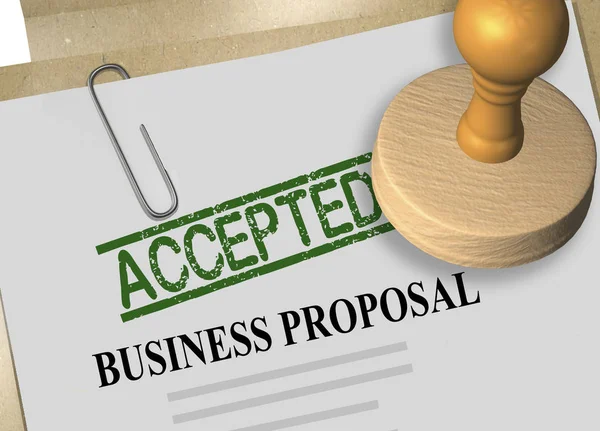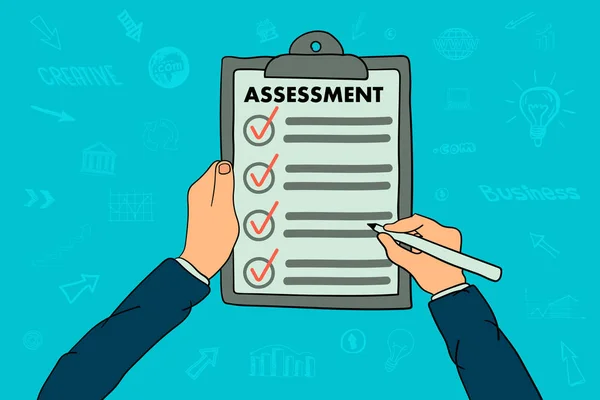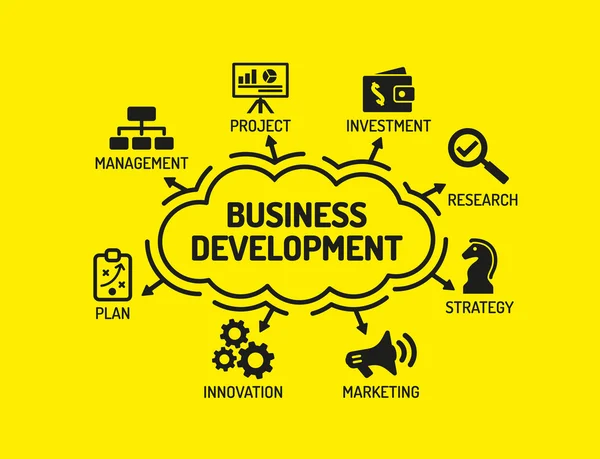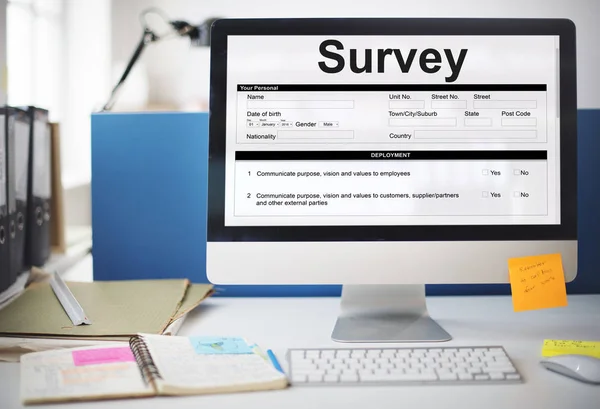Are you stuck writing a proposal for your project or organization? Have you suffered repeated rejections for your proposals? If so, you’re not alone. Crafting a compelling grant proposal can feel like navigating a maze without a map. Whether you’re new to the process or looking to refine your skills, understanding the key elements of a winning proposal is crucial.
Whether you’re an NGO launching a community initiative or a startup seeking funds for an innovative idea, a winning grant proposal opens doors and builds credibility. But here’s the truth: writing a great proposal takes strategy, skill, and insight. If you’re looking to elevate your proposal writing or want expert assistance, I can guide you through creating persuasive, targeted proposals that not only grab attention but secure support.
In this guide, you will learn how to write a successful grant proposal, that captures your funders’ attention and increase your chances of securing the technical or funding support you need. From telling a compelling story to breaking down budgets, here’s how to make your next proposal a winning one.
What is a Grant Proposal?
A grant proposal is a formal request to a government agency, foundation, corporation, or other funding organization, seeking financial or technical support for a specific project. This document outlines the project’s purpose, goals, and a plan for execution, clearly explaining why funding is needed and how it will be used. It’s both a roadmap for the project and a persuasive argument for its value.
Types of Proposals
Grant proposals can be classified based on whether they are solicited or unsolicited.
| Type of Proposal | Description | Characteristics |
|---|---|---|
| Solicited | Submitted in response to specific requests for proposals (RFPs) or funding announcements. | – Guidelines provided – Competitive environment – Must align with funders’ goals |
| Unsolicited | Submitted without a specific request, initiated by the organization seeking funding. | – No specific guidelines – Must create demand – Focus on building relationships with funders |
Solicited Grant Proposals
Solicited grant proposals are crafted in response to specific requests for proposals (RFPs) issued by funding organizations. Your application process will follow well-defined requirements from the donor. These proposals are structured to meet detailed guidelines and criteria provided by the funder, ensuring that they align closely with the organization’s strategic priorities. As these opportunities often attract multiple applicants, competition is fierce, necessitating a clear and compelling presentation of how the proposed project addresses the funder’s objectives. Common examples include;
- Government grants
- Foundation funding
- Corporate Sponsorships
Unsolicited Grant Proposals
In contrast, unsolicited grant proposals are submitted without an explicit request from the funding body. These proposals are initiated by organizations seeking support for projects that may not directly respond to a specific RFP. With fewer restrictions, unsolicited proposals allow for greater creativity and flexibility in content, but they must effectively demonstrate the need for funding and the potential impact of the proposed initiative. This type of proposal serves not only as a request for funding but also as an opportunity to build relationships with funders, which could facilitate future collaborations or grant opportunities. Examples include general proposals to foundations that accept submissions on an ongoing basis.
Classes of Grant Proposals
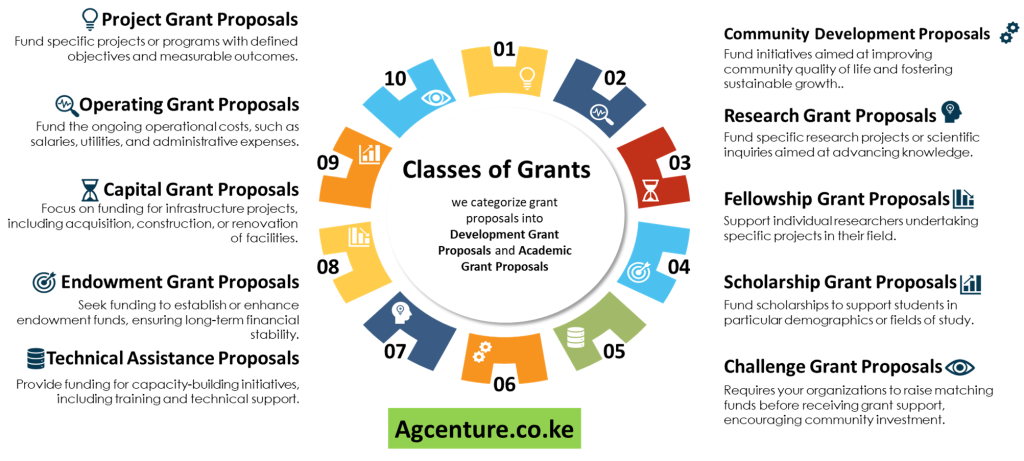
There are many types of grant proposals you can prepare as an individual or organization. The figure below outlines 10 types of proposals you can write. They are categorized into Development Grant Proposals and Academic Grant Proposals.
- 🌍 Development Grant Proposals: These proposals are designed for organizations seeking funding to implement projects, enhance community welfare, or build organizational capacity.
- 🎓 Academic Grant Proposals: These proposals are tailored for academic and research institutions seeking funding for studies, projects, or programs that contribute to knowledge and innovation.
Our team at Agcenture consulting services can support you in crafting proposals that are persuasive and aligned with your funder expectations.
Why Are Grant Proposals So Important?
Grant proposals are the lifeblood of many impactful initiatives—from community-based projects to innovative research. They enable organizations to articulate the vision, scope, and impact of their work in a structured way, making it easier for potential funders to see the value. Beyond funding, a well-written proposal also builds partnerships, fosters collaboration, and helps focus on measurable impact and sustainability. In short, crafting a solid grant proposal is more than just a step in the funding process—it’s an exercise in clear, strategic planning.
How to Make Your Grant Proposal Stand Out
To write an outstanding grant proposal, focus on clarity, alignment, and impact. Start by thoroughly researching the funder’s mission, priorities, and guidelines to ensure your project aligns with their objectives. Begin your proposal with a compelling problem statement that demonstrates the need for your project and its relevance to the community or cause. Clearly outline your goals, expected outcomes, and the specific steps or methodologies you’ll use to achieve them, backing these up with evidence or data when possible.
Use a concise, organized format, breaking down budgets, timelines, and evaluation methods to demonstrate careful planning and resource allocation. Finally, communicate your organization’s track record and expertise to establish credibility, and always proofread meticulously to ensure professionalism throughout.
Below we list the best 10 tips to write the best proposal
Tell a Story, Don’t Just State Facts
A well written proposal is more than a formal request; it should tell a story about how your project will make a difference. Use a narrative that paints a vivid picture, highlighting both the problem and the promise of your project. Anchor your proposal in real-life examples or testimonials to add emotional weight.
Align with the Funder’s Mission
Every funder has specific priorities. Tailor each proposal to echo these, showing how your project fits your donor’s goals. If they prioritize sustainable development, emphasize how your project addresses long-term impact.
Use Research Data & Evidence to Strengthen Your Case
One of the unknown secrets to make your grant application stand out is using real data. Using statistics, case studies, and relevant research findings is a powerful tools in a grant proposal. But don’t just stack numbers—interpret them. Show how the data highlights a gap or challenge your project can uniquely address.
Set SMART Goals
Funders want to fund a project with SMART goals or results. Define what success looks like with concrete, measurable goals. Whether it’s a specific number of beneficiaries, reduced response time, or other measurable outcomes, clear goals show funders that you’re focused on impact.
- 🧭 Specific: Clearly define the goal with precise details to answer who, what, where, why, and which aspects are involved.
- 📏Measurable: Establish criteria to track progress and measure the outcome. Define how success will be quantified, making it easier to stay on course and celebrate milestones.
- 🎯Achievable: Set realistic goals that can be accomplished within the constraints of time, resources, and capabilities.
- 🔗Relevant: Ensure the goal aligns with broader objectives, values, or mission, making it impactful and purposeful. Relevance connects the goal to overall priorities.
- ⏰Time-bound: Set a clear timeframe or deadline to instill urgency and encourage focus. This could be a specific date or a timeframe (e.g., “within six months”).
Outline a Clear M&E Plan
Show your sponsor that you are committed to accountability by including a detailed monitoring and evaluation (M&E) plan for measuring and reporting success. Describe the specific metrics or Key performance indicators (KPIs) and tools you’ll use, such as surveys, interviews, or data tracking methods, and link them to each project objective.
Craft a Realistic, Transparent Budget
Your budget isn’t just a list of expenses—it’s a reflection of your project’s financial planning. Break down costs, explain each line item, and avoid broad categories like “miscellaneous.” A well-organized budget builds funder confidence and underscores your project’s feasibility.
Invest in Professional Presentation and Formatting
A polished presentation makes a lasting impression. Use variety of headings, bullet points, and visuals like charts or infographics to break up text. Ensure readability with a professional font, consistent spacing, and clear organization. A well-formatted proposal reflects your professionalism and attention to detail.
Highlight Partnerships and Collaboration
Funders value projects with a broad support. List any existing or planned community partnerships or collaborative efforts that demonstrate community buy-in. By showcasing the network backing your project, you strengthen your proposal and its potential for impact.
Edit Ruthlessly and Seek Honest Feedback
Strong proposals are concise, error-free, and to the point. Review your proposal multiple times to catch typos, grammar errors, and clarity issues. If possible, ask someone outside your team to read it—they can spot areas where the message could be clearer or more compelling.
Stay Focused on the Vision
Passion is contagious. As you craft your proposal, ensure that each section reflects your vision and commitment to the cause. Highlight how the project aligns with your organization’s mission, letting funders see your dedication to making a real, lasting impact.
A Step-by-Step Guide on Formatting Your Grant Proposal

Here’s a streamlined outline format to ensure your grant proposal is easy to follow. The parts are professionally structured:
- Cover Letter: A brief introduction to your organization, an overview of the project, and the requested amount, all personalized for the funder.
- Title Page: Include your project title, organization name, contact information, and date of submission.
- Table of Contents: List all sections and page numbers to help funders navigate.
- Executive Summary: A succinct overview of the proposal, including the problem, solution, and funding request.
- Problem Statement: Define the problem your project addresses, backed by relevant data and evidence.
- Project Description:
- Goals and Objectives: Clear targets you aim to achieve.
- Methods: Detailed steps for implementation.
- Timeline: Key milestones and deadlines.
- Staffing: Who will be involved and their qualifications.
- Budget: A transparent breakdown of costs, with justifications for each item. Mention additional funding sources if applicable.
- Evaluation Plan: Explain how you’ll assess the project’s success using specific metrics and methods.
- Sustainability Plan: Describe how the project will continue after the grant ends, ensuring long-term impact.
- Appendices (if necessary): Include additional materials like letters of support, resumes, or charts.
Which are the Common Mistakes to avoid in Grant Proposal writing
Successful grant writing combines strategic planning with persuasive storytelling. By conducting in-depth research, articulating clear objectives, and presenting a well-supported case, you can create a proposal that resonates. Remember, every proposal is an opportunity to not only seek funding but to inspire, connect, and drive impactful change.
.Below are 5 mistakes that you will need to avoid to make sure you win. sidestep these pitfalls to boost your chances of success:
- Ignoring Research on Funders – Not aligning with the funder’s priorities is a surefire way to lose interest. Each proposal should feel tailored, not generic.
- Poorly Defined Budget – An unclear or excessive budget raises red flags. Detail each expense to show that funds will be used wisely and effectively.
- Ignoring Submission Guidelines – Not following funder guidelines for solicited applications can result in rejection. Double-check length, format, and required sections before submission.
- Neglecting the Evaluation Plan – Lacking a clear way to measure success makes your proposal feel incomplete. Funders want assurance that their investment will yield results.
- Weak Narrative – A dry, overly technical proposal won’t engage. Bring the project to life with a compelling narrative that resonates with the reader.
Conclusion: Keys to Successful Grant Writing
Writing a winning grant proposal isn’t just about following a template; it’s about aligning your organization’s mission with that of the funder, crafting a compelling case for support, and demonstrating a clear, measurable impact. With careful attention to each step, you’re well on your way to securing the support your project deserves.
Looking for expert help with your proposal writing in Kenya? Agcenture consults in writing winning grant proposals and concept notes for NGOs, CBOs and small businesses to finance your ideas! Reach out today via WhatsApp for a quick quote.

